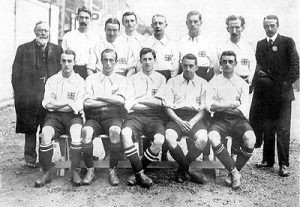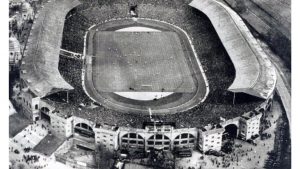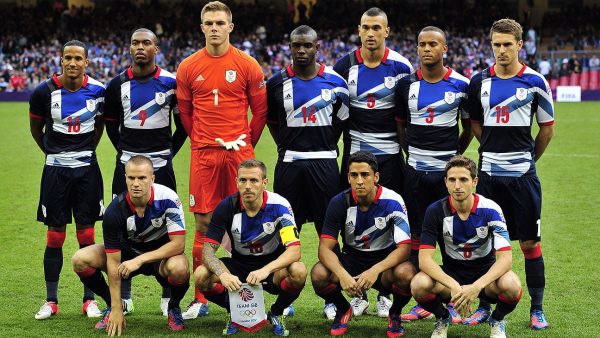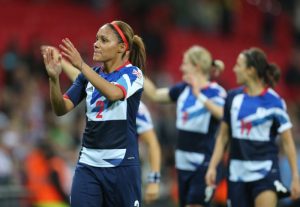London has been lucky enough to host three Olympic games, with the most recent being in 2012.
Generally speaking, Great Britain has been very successful at the Olympics, having come third in the medal table at the home games eight years ago, being beaten only by USA and China.
However, a lot of these medals have come from the athletics track, cycling track and in rowing boats. But what about the nation’s most popular sport, football?
1908
The first British Olympic football team was assembled in 1908, which was actually the first games hosted in London. It was also the first official Olympic football tournament to be held on the world stage.
Despite the team representing Britain, all squad members were English, and so were referred to as the ‘England national amateur football team’. This was because the tournament was staged under the authority of FIFA, and Wales, Scotland and Northern Ireland were not yet members. They later became members in 1910.

Britain won all three of their games during this Olympics, defeating Sweden 12-1 in the first round, the Netherlands 4-0 in the semi-final, and ultimately beating Denmark in the final 2-0 to claim the gold medal. The goals were scored against the Danes by Vivian Woodward, formerly of Tottenham Hotspur and Chelsea, and Frederick Chapman who played three senior games for Nottingham Forest in his career.
1948
The next Olympic games to be held in London was in 1948. This time round, there were 18 participants in the football tournament, compared to just six in 1908. Matches this time around were played all over London. Grounds included White Hart Lane, Craven Cottage, Highbury, Selhurst Park and of course Wembley.

Great Britain this time had a squad made up of players from all ‘home nations’ and was managed by Manchester United boss Sir Matt Busby. The team were relatively successful, despite being made up of mostly amateurs and managed to qualify for the semi-finals. Their opening game was against the Netherlands, who they narrowly defeated 4-3 but only after extra time. Harry McIlvenny got the winner with 111 minutes played, which sent them through to the quarterfinals.
The quarter final was an equally tight affair, with the hosts coming up against bitter rivals France. The game was played in front of 25,000 spectators at Fulham’s Craven Cottage and Busby’s side managed to knock out the French with a 1-0 victory thanks to a Bob Hardisty goal on 30 minutes.
The next game sadly saw Britain exit the competition against Yugoslavia at Wembley stadium. The game ended 3-1 to the Eastern European side who outclassed the home side on the day. Frank Donovan scored the only British goal, which saw them eliminated into the bronze medal match against Denmark, who were knocked out by Sweden. This game was also played at Wembley, in front of 50,000 supporters, and was an eight-goal thriller. Unfortunately, Britain were on the losing side and suffered a 5-3 defeat, meaning they would finish fourth in the overall standings.
2012
This brings us to 2012, where London hosted arguably one of the best Olympic games of all time. East London played a huge part in these games, with Stratford being the home of the brand-new Olympic Park, which saw the regeneration of large parts of our capital city.
As for the football, it was the first time that London had staged both a men’s and women’s tournament, with the first women’s tournament being held in 1996 at the Atlanta games. It was also the first time in 52 years that a British team had competed at an Olympic games, due to complications with squad selections and countries within the home nations not wanting to lose their status within FIFA.
These complications continued in the build-up to the 2012 games, with Scottish, Welsh and Irish FA’s threatening to pull out if their individual status at FIFA is affected. This was later settled with the FIFA Executive Committee saying that they’re statuses will not be affected should a mixed Britain team be selected.

Having said that, Team GB boss Stuart Pearce named no Scottish or Northern Irish players in his 18-man squad, which won’t have gone down well with the people of those nations.
The group stage proved to be a success for Team GB who qualified for the knockout stage in top spot, having beaten United Arab Emirates, Uruguay and picking up a point against Senegal. Craig Bellamy, Daniel Sturridge, Ryan Giggs and Scott Sinclair were amongst the goal scorers for the home team.
After a relatively easy group stage, Team GB came up against a South Korea side who had only won one game in the tournament so far. The game was a tight one as Aaron Ramsey levelled proceedings after Ji Dong-won put the visitors ahead. The scores stayed level for the remainder of the game and needed penalties to decide a winner, which have been notoriously cruel to England in particular in tournament football.
This time was no different, as Pearce’s men crash out after losing 5-4 on penalties thanks to a South Korean masterclass. Daniel Sturridge missed Britain’s fifth penalty, meaning Celtic’s Ki Sung-yueng had to score to send them through, which he did emphatically.
The women’s team fared no better than the men, who were also knocked out in the quarter finals. However, manager Hope Powell managed to guide the side to a group stage whitewash, with three wins out of three and without conceding a goal. The team was full of talented players such as Rachel Yankey, Alex Scott, Steph Houghton and Jill Scott to name but a few, and so plenty was expected with a place in the medals a real possibility.

Team GB’s group games were against New Zealand, Cameroon and Brazil which were won 1-0, 3-0 and 1-0 respectively. This meant they would come up against Canada in the quarter -final, a side that finished their group in third and managed to qualify due to being the best third placed team in the groups. They had only won one of their group games, so on paper it should’ve been a comfortable win for the Team GB ladies.
Contrary to form, Canada were able to defeat the host nation 2-0, with a goal from Christine Sinclair who would go on to become the tournament’s top scorer with six goals.
So, British football has existed at the Olympic games for over 100 years, and we have been lucky to host the competition on our soil three times. We managed to win gold on one occasion and put together a successful women’s team for the first time in 2012.
The sport has gone from strength to strength in terms of inclusivity, by allowing players from all the home nations to participate in both the men’s and women’s games, and hopefully will continue to grow in the same way for future Olympics.



